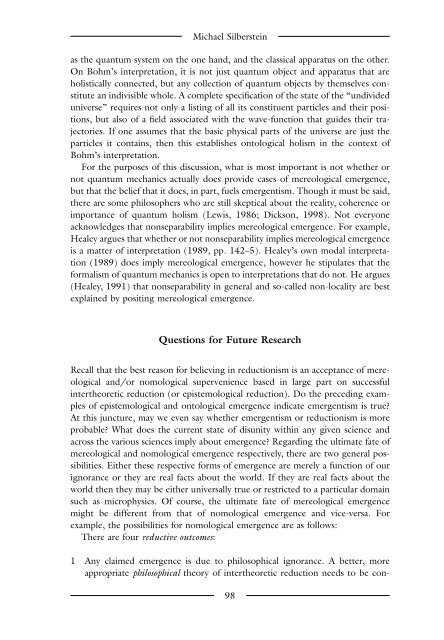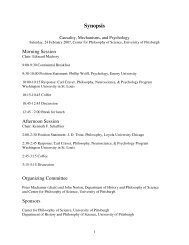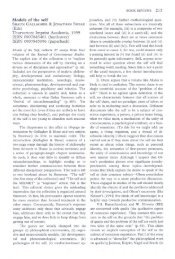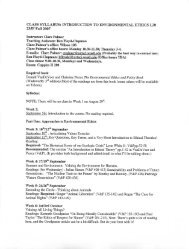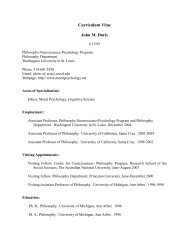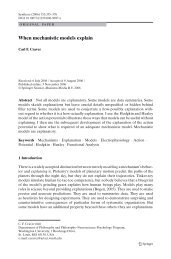The Blackwell Guide to the Philosophy of Science - The Department ...
The Blackwell Guide to the Philosophy of Science - The Department ...
The Blackwell Guide to the Philosophy of Science - The Department ...
Create successful ePaper yourself
Turn your PDF publications into a flip-book with our unique Google optimized e-Paper software.
Michael Silberstein<br />
as <strong>the</strong> quantum system on <strong>the</strong> one hand, and <strong>the</strong> classical apparatus on <strong>the</strong> o<strong>the</strong>r.<br />
On Bohm’s interpretation, it is not just quantum object and apparatus that are<br />
holistically connected, but any collection <strong>of</strong> quantum objects by <strong>the</strong>mselves constitute<br />
an indivisible whole. A complete specification <strong>of</strong> <strong>the</strong> state <strong>of</strong> <strong>the</strong> “undivided<br />
universe” requires not only a listing <strong>of</strong> all its constituent particles and <strong>the</strong>ir positions,<br />
but also <strong>of</strong> a field associated with <strong>the</strong> wave-function that guides <strong>the</strong>ir trajec<strong>to</strong>ries.<br />
If one assumes that <strong>the</strong> basic physical parts <strong>of</strong> <strong>the</strong> universe are just <strong>the</strong><br />
particles it contains, <strong>the</strong>n this establishes on<strong>to</strong>logical holism in <strong>the</strong> context <strong>of</strong><br />
Bohm’s interpretation.<br />
For <strong>the</strong> purposes <strong>of</strong> this discussion, what is most important is not whe<strong>the</strong>r or<br />
not quantum mechanics actually does provide cases <strong>of</strong> mereological emergence,<br />
but that <strong>the</strong> belief that it does, in part, fuels emergentism. Though it must be said,<br />
<strong>the</strong>re are some philosophers who are still skeptical about <strong>the</strong> reality, coherence or<br />
importance <strong>of</strong> quantum holism (Lewis, 1986; Dickson, 1998). Not everyone<br />
acknowledges that nonseparability implies mereological emergence. For example,<br />
Healey argues that whe<strong>the</strong>r or not nonseparability implies mereological emergence<br />
is a matter <strong>of</strong> interpretation (1989, pp. 142–5). Healey’s own modal interpretation<br />
(1989) does imply mereological emergence, however he stipulates that <strong>the</strong><br />
formalism <strong>of</strong> quantum mechanics is open <strong>to</strong> interpretations that do not. He argues<br />
(Healey, 1991) that nonseparability in general and so-called non-locality are best<br />
explained by positing mereological emergence.<br />
Questions for Future Research<br />
Recall that <strong>the</strong> best reason for believing in reductionism is an acceptance <strong>of</strong> mereological<br />
and/or nomological supervenience based in large part on successful<br />
inter<strong>the</strong>oretic reduction (or epistemological reduction). Do <strong>the</strong> preceding examples<br />
<strong>of</strong> epistemological and on<strong>to</strong>logical emergence indicate emergentism is true?<br />
At this juncture, may we even say whe<strong>the</strong>r emergentism or reductionism is more<br />
probable? What does <strong>the</strong> current state <strong>of</strong> disunity within any given science and<br />
across <strong>the</strong> various sciences imply about emergence? Regarding <strong>the</strong> ultimate fate <strong>of</strong><br />
mereological and nomological emergence respectively, <strong>the</strong>re are two general possibilities.<br />
Ei<strong>the</strong>r <strong>the</strong>se respective forms <strong>of</strong> emergence are merely a function <strong>of</strong> our<br />
ignorance or <strong>the</strong>y are real facts about <strong>the</strong> world. If <strong>the</strong>y are real facts about <strong>the</strong><br />
world <strong>the</strong>n <strong>the</strong>y may be ei<strong>the</strong>r universally true or restricted <strong>to</strong> a particular domain<br />
such as microphysics. Of course, <strong>the</strong> ultimate fate <strong>of</strong> mereological emergence<br />
might be different from that <strong>of</strong> nomological emergence and vice-versa. For<br />
example, <strong>the</strong> possibilities for nomological emergence are as follows:<br />
<strong>The</strong>re are four reductive outcomes:<br />
1 Any claimed emergence is due <strong>to</strong> philosophical ignorance. A better, more<br />
appropriate philosophical <strong>the</strong>ory <strong>of</strong> inter<strong>the</strong>oretic reduction needs <strong>to</strong> be con-<br />
98


